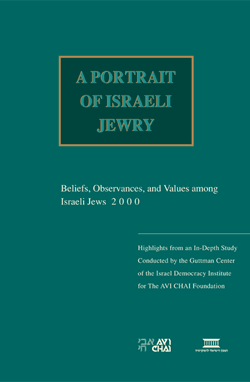A Portrait of Israeli Jewry
Beliefs, Observances, and Values among Israeli Jews 2000 (Abstract)
- Written By: Shlomit Levy, Hanna Levinsohn, Elihu Katz
- Publication Date:
- Cover Type: Softcover | Also available in Hebrew and Russian
- Number Of Pages: 25 Pages
- Center: Religion and State Program
This abstract highlights the main findings of a comprehensive project mapping Jewish religious beliefs and observance in Israel. The study embraces a variety of topics including observance of religious traditions, Jewish and general beliefs and values, issues associated with the role of religion in public life, and relations among social groups.
1. Introduction
1.1. Preface
1.2. Abstract
2. Religious Self-Definition
2.1. Religious Identity
2.2. Observance of Tradition
2.3. The Religious Identity Scale
3. Observances
3.1. General Remarks
3.2. Shabbat
4. Beliefs, Values and Identity
4.1. Beliefs
4.2. General Values
4.3. Jewish Values
4.4. Jewish Identity and Self-Identification
5. Religion, State and the Public Sphere
6. Intergroup Relations
7. Religiosity and Ethnicity
8. Religious Identity and Intergenerational Provesses
9. Observances of Tradition by the Non-Religious
10. Immigrants from the Former Soviet Union
11. Long term Changes
Israeli Jews have a strong Jewish identity. A large majority want Israel to have a Jewish character- even though they cannot agree on the parameters of this character. A large majority consider themselves part of the Jewish people – even though their closeness to Diaspora Jewry is waning.Most Israeli Jews feel some sort of connection with Jewish tradition, observe at least some of its practices and life-cycle rituals, and mark at least some of its festivals.
Basically, Jews in Israel are committed to two distinct values: tradition and individual freedom of choice. For the groups at the two ends of the religious identity spectrum-the haredim/strictly observant and the anti-religious-one of these values completely overshadows the other. The vast majority of Israeli Jews, however, attempt to integrate the two.
The lifestyles, values, and identity of most Israeli Jews reflect a profusion of efforts to maintain a bond to Jewish tradition, on the one hand, and maximum freedom of choice, on the other. The result is a fairly broad Israeli-Jewish consensus that reflects a commitment to Jewish continuity, but does of binding imperatives and rejects anything that is perceived as religious coercion.
Several findings of this study are disturbing, notably the deterioration in the perceived quality of intergroup relations in Israel and an increasing distance between Israeli and Diaspora Jewry. The sense of intra-Israeli and pan-Jewish unity is eroding. Furthermore, among the non-religious (especially Ashkenazim and the better-educated), the intensity of Jewish identity is gradually declining, and there is confusion regarding the meanings of the terms "Jew" and "The Jewish state" should possess. Nevertheless, there is no doubt that what characterizes most Jews in Israel is their adherence to a personal Jewish identity alongside their wish to shape a public Jewish identity.

